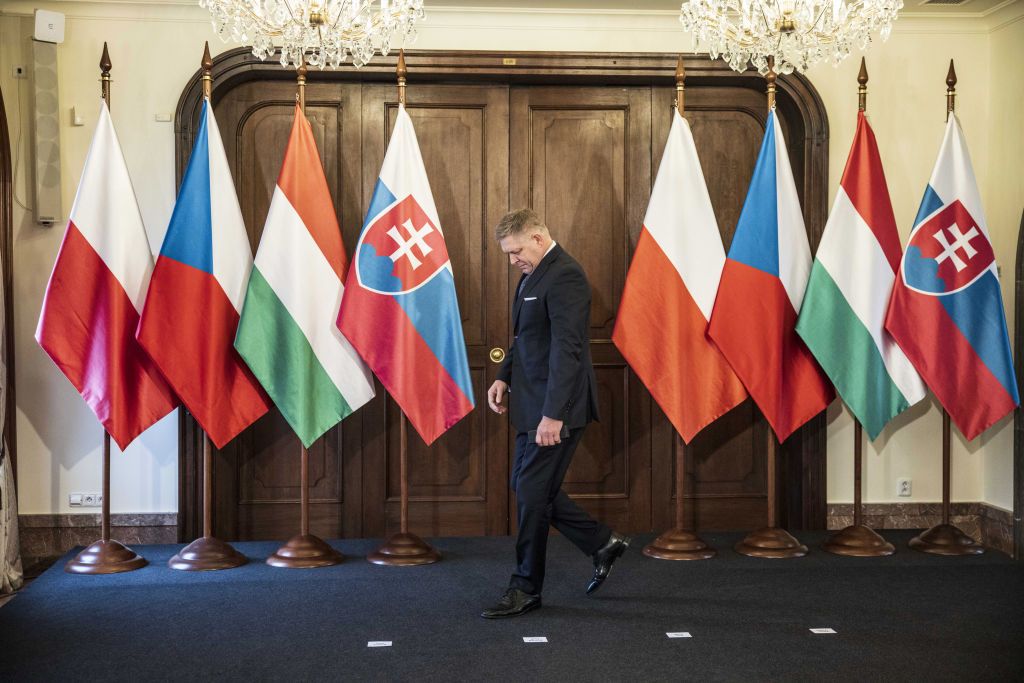What happens when war deniers see Ukraine for themselves
Nikola (L) and Ivo at an aerial bomb impact site in Izium, Kharkiv Oblast, Ukraine, in October 2024. (Stanislav Krupař / Punk Film)

Adam Sybera
The international coverage of Russian aggression has become a routine exercise for the sensation-seeking audience of the 21st century. It rarely offers new insights and is too often reduced to "daily news," consumed as a popular TV show that has already peaked and now has too many seasons.
As the Russian propaganda machine invests billions into shifting the global paradigm regarding Ukraine, politicians are becoming increasingly clueless. No longer knowing how to engage a public tired of war, they slowly begin to fear voter disapproval more than the prospects of open war with Russia, and thus, are losing the narrative battle.
So, when in early February 2024, Punk Film approached me with an idea of shooting a film that confronts the people of the Czech Republic with the war reality of today's Ukraine, I immediately agreed.
But how do we do it? How will we hack through the abundance of information and make it engaging and effective?
Having spent time both volunteering in Ukraine and documenting Russian war crimes, I thought it would be valuable to bring along criminologist Petr Pojman, who has vast experience in studying criminal elements and the deviant behavior of the Russian army.
Shortly after, the producer came up with a concept where he would take some of the most staunch supporters of Russia found in the Czech Republic, through war-ravaged Ukraine, to witness firsthand the actions of Moscow that they so admire.
Essentially, the goal was to document the raw reaction of those who deny Russian war crimes when confronted with these atrocities, and understand the actual grip of Russian propaganda on those who choose it as a primary source of information.
Voices that side with Russian narratives are no longer small cohorts of individuals marginalized within society. Political parties that profile themselves as opposed to aiding Ukraine are now part of the current European political mainstream, and namely in Central Europe, often participate in forming governmental policy.
This trend is set to cement with general elections in the Czech Republic, where the ANO party, whose oligarch leader Andrej Babis — profiling as a candidate of peace — is signaling a governmental coalition with two openly pro-Russian parties. One from the far-left and the other from the far-right.
According to current political polls, together they have a support of approximately 55% of the population eligible to vote.
To both understand this and draw attention to the dire consequences stemming from it, Punk Film conducted a casting, searching for people who don't see Russia as the aggressor and prefer "alternative" sources of information as opposed to traditional media, and decided to bring them to Ukraine, equip them with cameras and encourage them to bring their own testimony of the war in Ukraine.
The selected three all came from different backgrounds and various life situations. An interesting common denominator was that all three of the "protagonists" have suffered personal tragedies in their private lives.
Without giving much of the film away, it became increasingly obvious that the drive behind being antagonistic towards Ukraine was a mixture of certainty in their view of the world, a deeply embedded bitterness, and, at the same time, feelings of not being heard or paid attention to — a certain sense of abandonment.
These vulnerabilities prove to be an ideal breeding ground for Russian propaganda, which preys on instigating seeded injustices. Tragically, it has the capability of turning ordinary people into justifiers of extreme violence and beings lacking a moral compass.
As Sasha Alvarova, explains in her book "Industry of Lies," the ideal victim of propaganda must have a completely clear, simple opinion. They know that they know.
For propaganda to work, it needs two aids: fear and ignorance.
Without the rock-solid conviction of knowing something — and belief of knowing it better than others — it would be impossible to reach so many people at once.
Electoral behavior is and will remain the true goal of propaganda and psychological operations.
One reason why Ukraine is more immune to the extreme notions of Russian propaganda, which, for instance, claims there is no war, is that Ukrainians live in the war — they see it, they feel it. I thought it would, therefore, make sense that if somehow this physical sensation was transferred into other countries, so would the immunity.

It is not that easy. Often, when the film's protagonists were confronted with reality, they at first didn't believe, would suddenly just adopt a position that explained the broader picture they had already created.
For instance, after seeing villages destroyed by the Russian army and finally admitting there is a war, they suddenly turned to justifying why the war happened — the Ukrainians must have brought it upon themselves.
It is much harder to demolish a fantasy and much easier to adjust a conception of reality to a structure that fits the fantasy. It is much easier to create a new lie than to admit to living in one.
This is nothing new, and neither is this the subject of the film. The film is not an attempt to rediscover the discovered, convert anyone, or even prove a position. Rather, it offers a deep dive into the minds of the fallen on the information front and a reality check for those diminishing the issue of disinformation.
The mental invasion Russia is waging penetrates far deeper than many care to admit.
The film premiered in cinemas on the anniversary of the Soviet invasion of Czechoslovakia of 1968, which prolonged the Soviet occupation of the country for another two decades. The production seeks to introduce the film into Ukrainian cinemas later this year.

Editor's Note: The opinions expressed in the op-ed section are those of the authors and do not purport to reflect the views of the Kyiv Independent.











